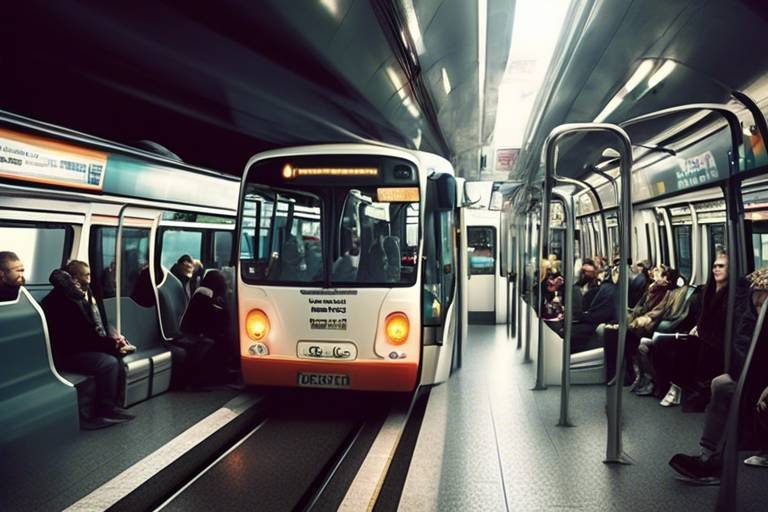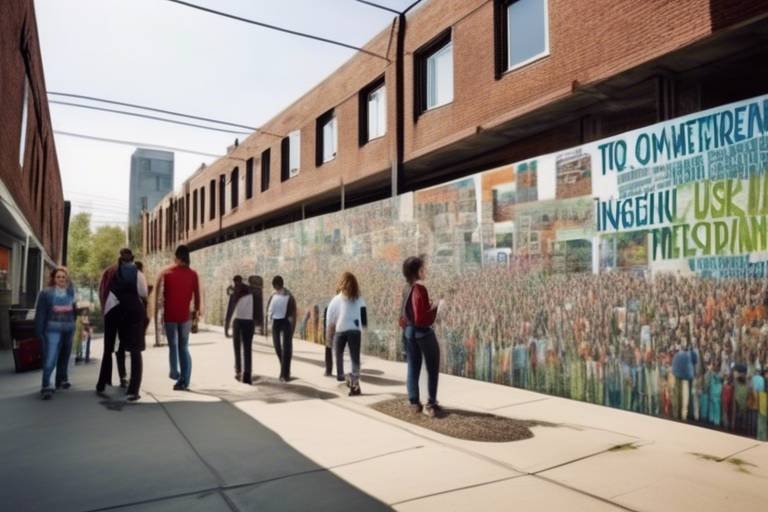Can Local Shopping Contribute to Urban Sustainability?
In recent years, the conversation around urban sustainability has gained momentum, with communities increasingly seeking ways to create a healthier and more resilient environment. One often overlooked but powerful player in this narrative is local shopping. It’s not just about picking up a loaf of bread from the corner store or grabbing a coffee from a neighborhood café; it’s about making conscious choices that ripple through our urban landscapes. So, how does local shopping tie into the bigger picture of urban sustainability? Let’s dive into the myriad ways that supporting local businesses can help cultivate a thriving, sustainable community.
When we think about sustainability, our minds often jump to recycling or renewable energy. However, the environmental impact of our shopping habits is equally significant. By choosing to buy from local retailers, we can drastically reduce our carbon footprints. Imagine the emissions saved when you opt for a shop just a few blocks away instead of a large chain store that sources products from hundreds or even thousands of miles away. Local shopping minimizes transportation emissions, which is a major contributor to urban air pollution. It’s like choosing to walk instead of drive; the benefits are immediate and tangible.
Additionally, local businesses often engage in more sustainable practices than larger corporations. Many small shops prioritize local sourcing, which not only reduces transportation emissions but also supports local farmers and artisans. This creates a circular economy where resources are reused and reinvested within the community, leading to a healthier urban environment. The result? Cleaner air, reduced traffic congestion, and a more vibrant community.
Now, let’s talk dollars and cents. Investing in local businesses isn’t just a feel-good decision; it’s an economic powerhouse for communities. When you spend money at a local shop, a significant portion of that money stays in the community, fueling local jobs and services. According to studies, local businesses generate three times more economic benefit for the local economy compared to chain stores. This is because local retailers often source their goods from other local suppliers, creating a robust network of economic activity.
One of the most compelling reasons to support local businesses is their role in job creation. When you buy from a local store, you’re not just purchasing a product; you’re helping to create and sustain jobs within your community. Local businesses are often the largest employers in their areas, providing jobs that are crucial for economic stability. Think about it: when you support a local shop, you’re directly contributing to the livelihoods of your neighbors. This fosters a sense of job security and enhances the overall economic health of urban areas.
Shopping locally goes beyond just economic benefits; it’s about building relationships. When you frequent local shops, you engage with the people who live and work in your community. This interaction fosters a sense of belonging and strengthens community ties. You might strike up a conversation with the owner, learn about their story, or even make a new friend. These connections create a network of support that is essential for a thriving urban environment.
Diversity is the spice of life, and this holds true for local economies as well. By shopping locally, you promote a variety of businesses, from quaint boutiques to family-owned restaurants. This diversity enriches the marketplace and ensures that your community remains vibrant and dynamic. A diverse business ecosystem is more resilient to economic downturns, which is a crucial factor in sustainable urban growth.
Despite the numerous benefits, local retailers face significant challenges. They often struggle against the fierce competition posed by larger retail chains and the convenience of online shopping. Many local businesses lack the marketing budgets and resources that big corporations have, making it difficult for them to attract customers. However, communities can combat these challenges by rallying behind their local shops and creating initiatives that promote local commerce.
To truly harness the benefits of local shopping, communities must implement effective strategies. This could involve creating awareness campaigns that highlight the importance of supporting local businesses. Additionally, offering incentives such as discounts or loyalty programs can motivate residents to choose local options. By fostering a culture that values local shopping, communities can enhance sustainable practices and contribute to a healthier urban environment.
Raising awareness about the benefits of local shopping is vital. Communities can organize events, workshops, and campaigns that educate residents on the positive impact of supporting local businesses. These initiatives can create a sense of pride in the community and encourage residents to make more sustainable shopping choices.
Offering incentives can be a game-changer for local shopping initiatives. Discounts, loyalty programs, and community rewards can encourage residents to shop locally. Imagine a program where every dollar spent at a local store earns you points towards discounts at other local businesses. This not only drives traffic to local shops but also fosters a sense of community collaboration.
- How does local shopping reduce carbon emissions? Local shopping reduces the distance products travel, thereby minimizing transportation emissions.
- What are the economic benefits of supporting local businesses? Local businesses keep more money within the community, creating jobs and stimulating local economies.
- How can communities promote local shopping? Communities can promote local shopping through awareness campaigns and incentives for residents.

The Environmental Impact of Local Shopping
When we think about shopping, our minds often drift to the bustling aisles of big-box stores or the endless scroll of online retailers. However, local shopping can play a pivotal role in shaping a more sustainable urban environment. By choosing to purchase from nearby retailers, we not only support our community but also contribute to a significant reduction in our carbon footprints. Imagine the impact if every resident opted to shop locally instead of driving miles to a distant store! The environmental benefits are profound and multifaceted.
One of the most immediate effects of local shopping is the reduction in transportation emissions. When consumers buy from local businesses, they often walk or bike to the store, or drive shorter distances compared to traveling to larger chain stores. This simple shift can lead to a noticeable decrease in greenhouse gas emissions. According to recent studies, local shopping can cut transportation-related emissions by as much as 30%. Not only does this help combat climate change, but it also contributes to cleaner air and a healthier urban environment.
Furthermore, shopping locally encourages the use of sustainable practices among businesses. Many local retailers prioritize eco-friendly products and practices, such as sourcing materials from nearby suppliers, reducing packaging waste, and implementing energy-efficient operations. This creates a ripple effect that promotes sustainable behavior throughout the community. For instance, local farmers' markets not only provide fresh produce but also reduce food miles, ensuring that the food on our plates is both fresh and environmentally friendly.
Moreover, local shopping fosters a sense of community stewardship. When residents are invested in their local economy, they are more likely to advocate for policies that support sustainability initiatives. This can include everything from supporting local recycling programs to participating in community clean-up events. In essence, local shopping transforms consumers into active participants in their community, creating a culture of sustainability that can have lasting effects.
However, it’s important to acknowledge that not all local shopping practices are automatically sustainable. Consumers should remain mindful of their choices. For example, supporting local businesses that prioritize sustainability over those that do not can make a significant difference. Here are some key considerations:
- Opt for businesses that use eco-friendly packaging.
- Choose retailers that source their products locally.
- Support companies that implement sustainable practices in their operations.
In conclusion, the environmental impact of local shopping is substantial and cannot be overlooked. By making conscious choices to support local businesses, we contribute to a healthier planet while fostering a vibrant community. The next time you consider where to shop, remember that your choices have the power to create a more sustainable urban future.

Economic Benefits of Supporting Local Businesses
When you think about shopping locally, you might picture quaint little shops and friendly faces, but the **economic benefits** extend far beyond just a pleasant shopping experience. Supporting local businesses is like watering a plant; it nurtures the roots of your community, helping it to flourish. Every dollar spent at a local store is not just a transaction; it’s an investment in the local economy. Studies show that local businesses tend to reinvest a significant portion of their earnings back into the community, which creates a **multiplier effect** that stimulates further economic growth.
Consider this: when you shop at a local store, you're not only supporting the owner and their family but also the employees who live in your neighborhood. This creates jobs and helps reduce unemployment rates. In fact, local businesses are known to create nearly twice as many jobs per dollar of sales compared to national chains. This is crucial for urban areas where job security can often feel like a tightrope walk. When you buy local, you’re effectively saying “yes” to job creation and “no” to the uncertainty that often accompanies large corporations.
Moreover, local businesses contribute to a vibrant and diverse marketplace. Imagine walking down a street filled with unique shops, each offering something different—this is the essence of a thriving local economy. It fosters **entrepreneurship**, allowing diverse ideas and products to flourish. The local economy becomes a rich tapestry of different flavors, styles, and experiences, which not only enhances consumer choice but also makes urban areas more attractive to residents and visitors alike.
But wait, there’s more! Local businesses often have a smaller environmental footprint compared to large chains. They tend to source their products locally, which reduces transportation emissions and supports local farmers and artisans. This is a win-win situation: you get fresh, quality products while promoting sustainable practices that benefit the entire community.
To illustrate the impact of supporting local businesses, let’s take a look at the following table:
| Aspect | Local Businesses | National Chains |
|---|---|---|
| Job Creation | Creates 2.5 times more jobs per revenue | Standard job creation |
| Economic Impact | Reinvests 68% of revenue locally | Reinvests only 43% locally |
| Environmental Footprint | Lower emissions due to local sourcing | Higher emissions due to long-distance shipping |
In conclusion, supporting local businesses is not just a feel-good activity; it’s a **strategic choice** that can lead to a more robust economy and a healthier urban environment. So, the next time you’re deciding where to shop, think about the ripple effect your choice can create. By choosing local, you’re not just buying a product; you’re investing in your community’s future.
Q: How does shopping locally help the environment?
A: Shopping locally reduces transportation emissions, as products do not need to be shipped over long distances. This helps lower the carbon footprint associated with consumer goods.
Q: What are some examples of local businesses?
A: Local businesses can include independent restaurants, boutique shops, local farms, and service providers like salons and repair shops that operate within your community.
Q: How can I find local businesses to support?
A: You can find local businesses through community directories, social media platforms, and local business associations. Many cities also have “Shop Local” campaigns that highlight participating businesses.

Job Creation and Local Employment
When you think about local shopping, what often comes to mind? Fresh produce, unique gifts, and that cozy little bookstore down the street, right? But there's so much more to it than just the products on the shelves. One of the most significant benefits of supporting local businesses is the job creation that comes with it. When you shop locally, you're not just buying a product; you're investing in your community and its people. This investment leads to a ripple effect of economic stability and growth.
Local businesses are typically more labor-intensive than larger corporations, meaning they require a greater number of employees to operate. For instance, a local bakery might need bakers, cashiers, and delivery drivers, while a small boutique might require sales staff and inventory managers. This demand for labor translates into job opportunities for residents, which is crucial for reducing unemployment rates in urban areas. In fact, studies have shown that for every $100 spent at a local business, approximately $68 stays in the community, compared to just $43 when spent at a national chain. This is not just a statistic; it's a testament to the power of local commerce.
Moreover, local businesses often provide jobs that are tailored to the community’s needs, offering flexible hours and positions that can accommodate various lifestyles. This is particularly beneficial for students, parents, and those seeking part-time work. By fostering a local workforce, communities can enhance their economic stability, creating a more resilient urban environment. When residents have stable jobs, they are more likely to invest back into their community, whether it’s through shopping, volunteering, or participating in local events.
However, it’s essential to acknowledge that local businesses face challenges that can impact job creation. Factors such as competition from larger retailers and online shopping can threaten their survival. To combat this, communities can implement strategies that support local businesses, such as promoting local shopping initiatives and creating awareness about the importance of buying local. By doing so, they can help ensure that local businesses thrive, which in turn leads to more job opportunities and a stronger economy.
In conclusion, the connection between local shopping and job creation is undeniable. When you choose to shop at local stores, you’re not just making a purchase; you’re contributing to a sustainable future for your community. So next time you’re tempted to click that “buy now” button online, consider the impact of your choice. Your community—and its job market—will thank you for it!

Strengthening Community Ties
Engaging with local businesses is not just about supporting the economy; it’s also about building relationships within the community. When residents choose to shop locally, they are not merely making a transaction; they are participating in a vibrant social fabric. Think about it: every time you step into a local shop, you’re likely to encounter familiar faces—friends, neighbors, and even the owners who often know you by name. This kind of interaction fosters a sense of belonging that is hard to replicate in larger, impersonal retail chains.
Moreover, local shopping encourages a shared identity among community members. When people come together to support their local businesses, they create a collective narrative that strengthens community ties. This shared experience can lead to collaborations, whether it’s a local farmer partnering with a nearby café or artists showcasing their work in local boutiques. The possibilities are endless, and these collaborations can lead to a more dynamic and interconnected urban environment.
Additionally, local businesses often engage in community events, sponsoring sports teams or hosting festivals. These activities provide opportunities for residents to come together, celebrate, and build friendships. When communities invest in their local economy, they are, in essence, investing in their own social well-being. Here are some ways local shopping strengthens community ties:
- Fostering Trust: Regular interactions with local business owners create a sense of trust and reliability, which is crucial for a healthy community.
- Encouraging Local Leadership: Local entrepreneurs often take on leadership roles in the community, advocating for initiatives that benefit everyone.
- Creating Shared Spaces: Local shops often serve as gathering spots, where people can meet, relax, and engage in meaningful conversations.
In conclusion, supporting local businesses is a powerful way to strengthen community ties. It transforms shopping into a social activity that nurtures relationships and fosters a sense of belonging. By choosing to shop locally, you’re not just making a purchase; you’re contributing to a thriving community and creating a more sustainable urban environment.
Q: How does local shopping help the environment?
A: Local shopping reduces transportation emissions, as products are sourced closer to home, minimizing the carbon footprint associated with long-distance shipping.
Q: What are the economic benefits of supporting local businesses?
A: Supporting local businesses stimulates the local economy, creates jobs, and fosters community development, leading to a more vibrant urban area.
Q: How can I encourage others to shop locally?
A: You can raise awareness about the benefits of local shopping, participate in community events, and share your positive experiences with local businesses.
Q: What challenges do local retailers face?
A: Local retailers often struggle against competition from larger chains and online shopping, which can make it difficult to attract and retain customers.

Encouraging Diverse Business Ecosystems
In today’s fast-paced world, the importance of diverse business ecosystems cannot be overstated. Local shopping plays a pivotal role in fostering a rich tapestry of businesses that cater to a variety of tastes and needs. Imagine walking down a vibrant street lined with unique shops, each offering something different—this not only enhances the shopping experience but also contributes to a more resilient economy. A diverse marketplace encourages innovation, creativity, and competition, which ultimately benefits consumers and the community alike.
When we talk about diversity in local businesses, we’re referring to a mix of industries, from artisanal bakeries and independent bookstores to tech startups and eco-friendly boutiques. This variety is crucial because it ensures that communities are not solely reliant on a few major players. Instead, they can enjoy a plethora of options that reflect their unique identities and preferences. Moreover, a diverse business landscape can help mitigate economic downturns; when one sector struggles, others may thrive, providing a buffer against financial instability.
Additionally, local businesses often have a greater understanding of their community's needs and preferences. They are more likely to tailor their products and services to meet local demands, which can lead to higher customer satisfaction. For instance, a local grocery store might prioritize sourcing produce from nearby farms, supporting sustainable practices while also providing fresher options for consumers. This kind of synergy not only enhances the shopping experience but also strengthens community ties.
However, promoting diverse business ecosystems doesn’t come without its challenges. Local retailers often face stiff competition from larger chains and online giants, which can overshadow the unique offerings of smaller shops. To combat this, communities can implement strategies that highlight the value of supporting local businesses. For example, organizing events like farmers' markets or local artisan fairs can draw attention to the variety of products available, showcasing the creativity and craftsmanship of local entrepreneurs. Such initiatives not only promote local shopping but also create a sense of pride among residents.
Furthermore, local governments can play a significant role in nurturing diverse business ecosystems. By providing resources such as grants, mentorship programs, and favorable zoning laws, they can help small businesses thrive. A collaborative approach that involves local chambers of commerce and community organizations can also amplify these efforts, ensuring that diverse businesses have the support they need to flourish.
In conclusion, encouraging diverse business ecosystems through local shopping is not just beneficial for consumers; it’s a vital component of sustainable urban development. By supporting a variety of businesses, communities can foster economic resilience, enhance social cohesion, and create vibrant environments that reflect their unique identities. So, the next time you consider where to shop, remember that your choices have the power to shape the future of your community.
- Why is local shopping important for urban sustainability?
Local shopping reduces transportation emissions, supports the local economy, and fosters community ties, all of which contribute to a more sustainable urban environment. - How does local shopping create jobs?
When consumers choose to shop locally, they help sustain and grow local businesses, which in turn creates job opportunities within the community. - What are some ways to encourage local shopping?
Communities can encourage local shopping through awareness campaigns, events, and incentives such as discounts or loyalty programs.

Challenges Faced by Local Retailers
Local retailers are the backbone of our communities, yet they face a multitude of challenges that can threaten their survival and sustainability. One of the most significant hurdles is the intense competition from larger chain stores and e-commerce giants. These larger entities often have the advantage of economies of scale, allowing them to offer lower prices that local shops simply cannot match. This price disparity can drive customers away from local businesses, making it increasingly difficult for them to thrive.
Moreover, the rise of online shopping has transformed the retail landscape. Many consumers now prefer the convenience of shopping from their couches, leading to a decline in foot traffic for local stores. This shift not only impacts sales but also diminishes the sense of community that local shopping fosters. When people choose to shop online rather than visit a local store, they miss out on the personal interactions that are so vital to building relationships within the community.
Additionally, local retailers often grapple with limited marketing budgets. Unlike larger corporations that can invest heavily in advertising and promotional campaigns, small businesses typically operate on tighter margins. This financial constraint can hinder their ability to effectively reach potential customers, further exacerbating the challenges they face. As a result, many local shops struggle to make their presence known in an increasingly crowded marketplace.
Another challenge is the lack of access to resources and support. Local retailers may find it difficult to obtain the necessary funding to expand or improve their operations. This lack of financial backing can stifle innovation and prevent them from adapting to changing market conditions. Furthermore, without sufficient mentorship or networking opportunities, local businesses may miss out on valuable insights and strategies that could help them navigate the competitive landscape.
Despite these challenges, many local retailers are finding creative ways to adapt and thrive. For example, some are embracing technology by developing user-friendly websites or leveraging social media to connect with customers. Others are collaborating with neighboring businesses to create unique shopping experiences that attract more visitors. This sense of innovation is crucial for overcoming the obstacles that threaten local commerce.
In summary, while local retailers face significant challenges, there are also numerous opportunities for growth and resilience. By understanding the hurdles they encounter, communities can come together to support these businesses and foster a more sustainable urban environment.
- What are the main challenges faced by local retailers?
Local retailers struggle with competition from larger chains, the rise of online shopping, limited marketing budgets, and lack of access to resources. - How can communities support local businesses?
Communities can support local businesses by promoting local shopping initiatives, providing resources and mentorship, and fostering collaboration among businesses. - What are some innovative strategies local retailers are using?
Many local retailers are embracing technology, such as developing websites and using social media, as well as collaborating with nearby businesses to enhance customer experiences.

Strategies for Promoting Local Shopping
In today's fast-paced world, where convenience often trumps community, promoting local shopping has become essential for fostering sustainable urban environments. There are numerous strategies that communities can adopt to encourage residents to support local businesses. First and foremost, creating a sense of awareness about the benefits of shopping locally is crucial. This can be achieved through engaging community campaigns that highlight how local shopping not only supports the economy but also enhances the social fabric of the community. Imagine walking through a vibrant market filled with friendly faces, where your purchases directly contribute to the livelihoods of your neighbors. This sense of connection can be a powerful motivator for residents to choose local stores over faceless online giants.
One effective approach is to organize community events that celebrate local businesses. Think street fairs, farmers' markets, or open-air concerts featuring local artists. These events not only draw people in but also create an atmosphere of excitement and community spirit. When residents see their friends and neighbors participating, it fosters a sense of belonging and encourages them to shop locally. Additionally, incorporating fun elements like contests or giveaways can further incentivize participation. For example, a "Shop Local Challenge" could encourage residents to visit a certain number of local stores within a month, with a prize for those who complete the challenge.
Moreover, implementing incentive programs can significantly boost local shopping. Communities can offer discounts or loyalty programs that reward residents for their purchases at local businesses. For instance, a "Local Loyalty Card" could provide customers with points for every dollar spent at participating stores, which can be redeemed for discounts or special offers. This not only encourages repeat business but also creates a sense of investment in the local economy. Imagine the excitement of knowing that every purchase you make is not just a transaction but a contribution to the community's growth!
Another strategy involves leveraging social media and digital platforms to promote local shopping. By creating engaging content that showcases local businesses, communities can reach a broader audience and encourage residents to explore their local options. Think about it: a vibrant Instagram feed featuring mouth-watering dishes from local restaurants or stunning crafts from nearby artisans can entice even the most reluctant shoppers to give local a try. Additionally, online directories or mobile apps that highlight local businesses can make it easier for residents to discover what’s available right in their neighborhood.
Furthermore, collaboration between local businesses can create a more robust shopping experience. For example, businesses can partner up for cross-promotions, offering discounts when customers shop at multiple locations. This not only enhances the shopping experience but also fosters a sense of community among local retailers. Imagine a local coffee shop teaming up with a nearby bookstore, offering a discount on coffee with the purchase of a book. Such partnerships can drive traffic and create a buzz that draws in more shoppers.
Lastly, community engagement is key. Hosting workshops or informational sessions that educate residents about the importance of supporting local businesses can be incredibly impactful. Topics could range from the economic benefits of local shopping to sustainability practices that local businesses implement. By empowering residents with knowledge, communities can inspire them to make conscious choices that benefit not just themselves but the entire urban ecosystem.
Q: What are some benefits of shopping locally?
A: Shopping locally helps reduce carbon footprints, stimulates the local economy, creates jobs, and fosters community relationships.
Q: How can I find local businesses to support?
A: You can explore local directories, social media platforms, or community bulletin boards that highlight nearby businesses.
Q: Are there any incentives for shopping locally?
A: Many communities offer loyalty programs, discounts, or special events that reward residents for shopping at local businesses.
Q: How can I get involved in promoting local shopping?
A: You can participate in local events, share information on social media, or volunteer with community organizations that support local commerce.

Community Engagement and Awareness Campaigns
Community engagement and awareness campaigns are the lifeblood of promoting local shopping and enhancing urban sustainability. Imagine walking into a store where the owner knows your name and the products are sourced from nearby farms or artisans. This connection not only enriches your shopping experience but also strengthens the local economy. To foster such connections, communities can implement various strategies that raise awareness about the benefits of supporting local businesses.
One of the most effective ways to engage the community is through educational workshops and events. These gatherings can showcase local products, provide information on sustainable practices, and even include cooking demonstrations using local ingredients. By inviting residents to participate, communities can create a buzz around local shopping and its positive impact on the environment and economy. Additionally, social media campaigns can amplify these messages, reaching a broader audience and encouraging more people to shop locally.
Moreover, local governments and organizations can collaborate to launch awareness campaigns that highlight the importance of supporting local businesses. This could involve using eye-catching posters, newsletters, and social media platforms to share stories of local entrepreneurs and the unique offerings they bring to the community. For example, a campaign could feature a "Local Business of the Month," showcasing their products and the sustainable practices they employ. Such initiatives not only inform residents but also instill a sense of pride in their community.
Another effective strategy is to create community loyalty programs that reward residents for shopping locally. These programs can be structured in various ways, such as offering points for every purchase made at local stores, which can later be redeemed for discounts or special offers. By providing tangible benefits for choosing local options, communities can motivate residents to think twice before heading to big-box retailers or online giants.
In addition to these strategies, it’s crucial to foster partnerships between local businesses and schools or community organizations. For instance, organizing field trips for students to local farms or workshops can educate younger generations about the significance of supporting their community. Such initiatives can create a ripple effect, as children share their experiences with family and friends, further spreading the message of local shopping.
Ultimately, community engagement and awareness campaigns are essential for creating a thriving local economy and promoting sustainable urban practices. By actively involving residents and providing them with the tools and knowledge they need to support local businesses, communities can cultivate a culture of sustainability that benefits everyone.
- Why is local shopping important for urban sustainability?
Local shopping reduces transportation emissions, supports the local economy, and fosters community ties, all of which contribute to a healthier urban environment. - How can I encourage my friends and family to shop locally?
Share your experiences, highlight local businesses on social media, and invite them to join you in exploring local shops and markets. - What are some examples of successful community engagement campaigns?
Examples include 'Shop Local' weeks, farmer's markets, and local business fairs that showcase the diversity of products available in the community.

Incentives for Local Shoppers
Encouraging residents to shop locally can be a game-changer for communities striving for sustainability. One of the most effective ways to do this is through incentives. These incentives can take various forms, and they not only benefit the consumers but also the local businesses and the community as a whole. Imagine walking into your favorite local store and being greeted with a smile, knowing that your purchase helps your neighbor pay their bills. Now, wouldn't that feel good?
Incentives can be as simple as offering discounts or as elaborate as creating loyalty programs that reward frequent shoppers. For instance, a local coffee shop might offer a free drink after every ten purchases. This kind of program not only encourages repeat visits but also fosters a sense of community as customers build relationships with the shop owners and staff. Additionally, local businesses can collaborate to create a community loyalty card that provides discounts across multiple stores, making shopping locally even more appealing.
Another effective strategy is to implement seasonal promotions or events that encourage local shopping. Imagine a weekend festival where local vendors set up booths, offering exclusive discounts and showcasing their products. Such events can create excitement and draw people in, allowing them to experience the unique offerings of their local businesses. Moreover, these events can serve as a platform for educating consumers about the environmental and economic benefits of supporting local commerce.
Furthermore, communities can utilize technology to provide incentives. For example, mobile apps that track local purchases could reward users with points redeemable at participating businesses. This not only makes shopping local fun but also integrates modern technology into traditional shopping practices. It’s like turning your shopping experience into a game, where every purchase brings you closer to a reward!
To sum it up, offering incentives is a powerful way to motivate residents to shop locally. By creating a win-win situation where shoppers save money and local businesses thrive, communities can enhance their economic resilience and promote sustainable practices. So, the next time you consider where to spend your hard-earned cash, remember that choosing local not only benefits you but also strengthens the fabric of your community.
- What types of incentives can local businesses offer? Local businesses can offer discounts, loyalty programs, seasonal promotions, and community events to encourage local shopping.
- How do incentives benefit local businesses? Incentives attract more customers, increase sales, and foster customer loyalty, which can lead to long-term success.
- Can technology help in providing incentives? Yes, mobile apps and digital loyalty programs can track purchases and reward customers, making the shopping experience more engaging.
- Why is shopping locally important? Shopping locally supports the local economy, reduces environmental impact, and strengthens community ties.
Frequently Asked Questions
- How does local shopping impact the environment?
Local shopping significantly reduces carbon footprints by minimizing transportation emissions. When you buy from nearby retailers, you help create a healthier urban environment, supporting sustainable practices that benefit everyone.
- What are the economic benefits of supporting local businesses?
Investing in local businesses stimulates the local economy, creating jobs and fostering community development. By shopping locally, you contribute to economic growth, which can lead to more job opportunities and enhanced community stability.
- How does local shopping create job opportunities?
When you support local businesses, you help create job opportunities within your community. This can lead to reduced unemployment rates and greater job security, which ultimately enhances economic stability in urban areas.
- In what ways does local shopping strengthen community ties?
Engaging with local businesses fosters relationships among community members. Shopping locally enhances social cohesion, creating a sense of belonging and connection that is vital for thriving urban environments.
- What challenges do local retailers face?
Local retailers often struggle with competition from larger chains and online shopping platforms. These challenges can make it difficult for them to thrive, but there are potential solutions that communities can implement to support local commerce.
- What strategies can communities adopt to promote local shopping?
Communities can implement various strategies to boost local shopping initiatives, such as raising awareness about the benefits of shopping locally and introducing incentives like discounts or loyalty programs that encourage sustainable consumer behavior.
- How can community engagement campaigns help local shopping?
Effective community engagement and awareness campaigns can motivate residents to choose local options. By highlighting the positive impacts of local shopping, these campaigns can create a stronger sense of community and encourage more people to support local businesses.



















